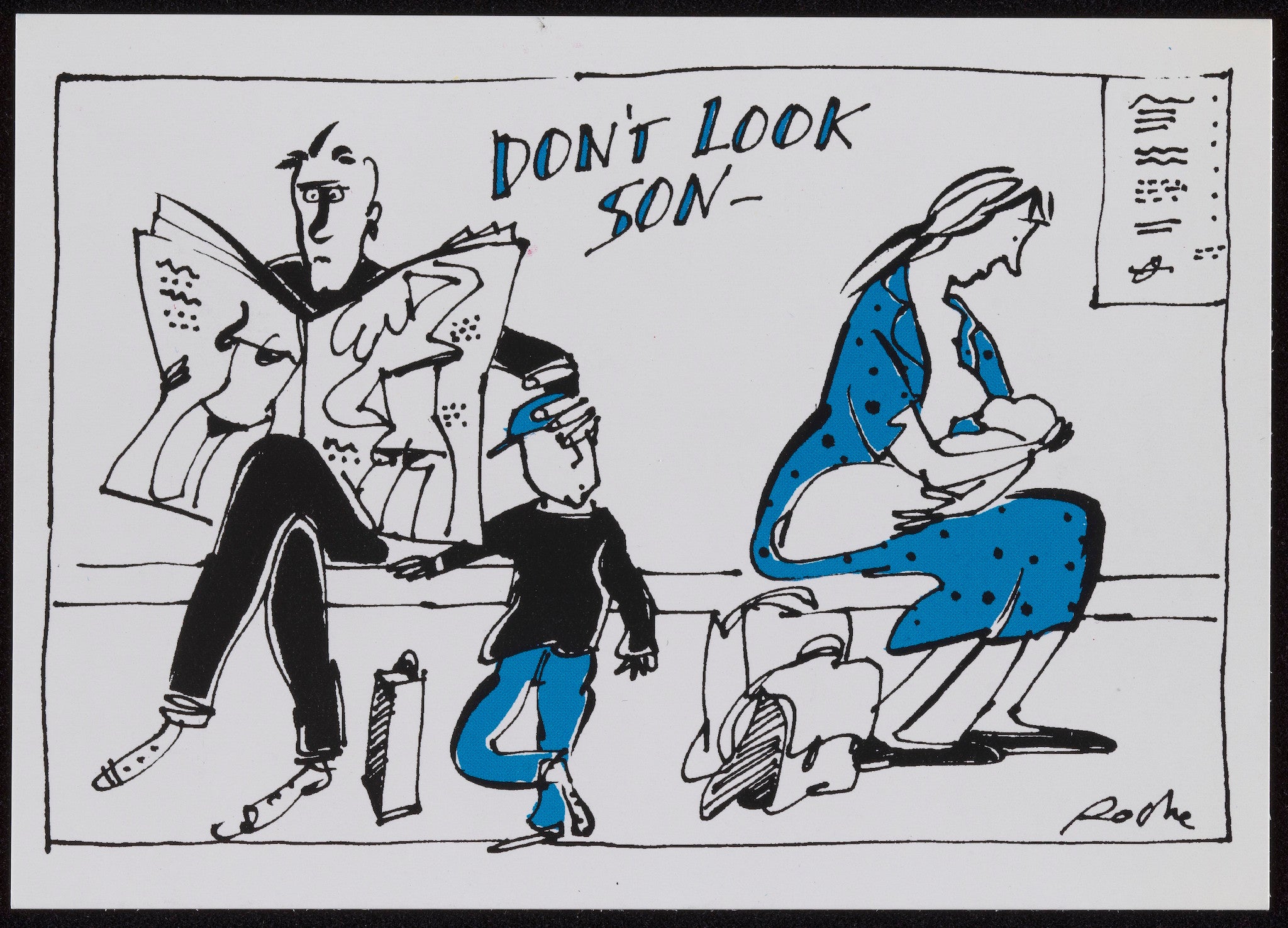Hilarious pro-breastfeeding poster among NCT archive preserved by Wellcome Trust
Wealth of birth material being preserved for posterity includes some very funny items

Thankfully it’s been a long time since pregnancy and childbirth were viewed as a disease. But the strides in progress, in terms of attitudes and advice, made in just the last 60 years have been put into remarkable focus by some of the pictures and documents from the archive of Britain’s biggest parenting charity the National Childbirth Trust.
The vast archive, which was this week transferred to the Wellcome Library, includes funny posters promoting breastfeeding (for which read: give me girly pictures in magazines but be sure to keep your baps wrapped up when your little one is hungry), an eye-watering pamphlet about episiotomies (you know, when they cut you during childbirth), and some uncompromisingly comic photographs from early ant-natal classes with hugely pregnant women trying out birth postures.
The NCT, which celebrates its 60th anniversary next year, was originally called the Natural Childbirth Association and was hugely influential in educating women via antenatal classes about the advice advocated by British obstetrician Grantly Dick-Read.
The charity was, and remains, one of the loudest voices towards the latter half of the 20th century in this country promoting breastfeeding, supporting home births and condemning over-medicalisation of childbirth and the overuse of interventions such as caesarian.
The huge archive of 270 boxes of material covers the NCT from its formation in 1956 to the present day, including labour and birth reports from as early as 1959, survey and research documents charting women’s experiences and attitudes towards becoming mothers, publications and photographs and footage of early antenatal classes.
“NCT’s archive not only tells the story of the institutional history of the charity, but also reflects how the experiences and expectations of parents, as well as the attitudes of doctors towards expectant mothers, have changed over the past 60 years,” said Elena Carter, Project Archivist at the Wellcome Library.
“The collection explores how women responded to their experiences of childbirth through organisation and advocacy, highlighting the development of post-war women’s activism and women’s rights, the growth of the consumer voice, and notions of choice and control in maternity care.”
Wellcome members can now request access to the archive at the library which is one of the world's major resources for the study of medical history housing more than 2.5 million items.
*An 1857 book entitled Hints to Husbands helpfully clears this up: “Childbirth is not a disease! It is simply the performance of a natural function, like eating, drinking &c., yet we treat it as though it were some formidable and dangerous malady.”
Thankfully it’s been a long time since pregnancy and childbirth were viewed as a disease. But the strides in progress, in terms of attitudes and advice, made in just the last 60 years have been put into remarkable focus by some of the pictures and documents from the archive of Britain’s biggest parenting charity the National Childbirth Trust.
The vast archive, which was this week transferred to the Wellcome Library, includes funny posters promoting breastfeeding (for which read: give me girly pictures in magazines but be sure to keep your baps wrapped up when your little one is hungry), an eye-watering pamphlet about episiotomies (you know, when they cut you during childbirth), and some uncompromisingly comic photographs from early ant-natal classes with hugely pregnant women trying out birth postures.
The NCT, which celebrates its 60th anniversary next year, was originally called the Natural Childbirth Association and was hugely influential in educating women via antenatal classes about the advice advocated by British obstetrician Grantly Dick-Read.
The charity was one of the loudest voices towards the latter half of the 20th century in this country promoting breastfeeding, supporting home births and condemning over-medicalisation of childbirth and the overuse of interventions such as caesarian.
The huge archive of 270 boxes of material covers the NCT from its formation in 1956 to the present day, including labour and birth reports from as early as 1959, survey and research documents charting women’s experiences and attitudes towards becoming mothers, publications and photographs and footage of early antenatal classes.
“NCT’s archive not only tells the story of the institutional history of the charity, but also reflects how the experiences and expectations of parents, as well as the attitudes of doctors towards expectant mothers, have changed over the past 60 years,” said Elena Carter, Project Archivist at the Wellcome Library.
“The collection explores how women responded to their experiences of childbirth through organisation and advocacy, highlighting the development of post-war women’s activism and women’s rights, the growth of the consumer voice, and notions of choice and control in maternity care.”
Wellcome members can now request access to the archive at the library which is one of the world's major resources for the study of medical history housing more than 2.5 million items.
*An 1857 book entitled Hints to Husbands helpfully clears this up: “Childbirth is not a disease! It is simply the performance of a natural function, like eating, drinking &c., yet we treat it as though it were some formidable and dangerous malady.”
Subscribe to Independent Premium to bookmark this article
Want to bookmark your favourite articles and stories to read or reference later? Start your Independent Premium subscription today.

Join our commenting forum
Join thought-provoking conversations, follow other Independent readers and see their replies